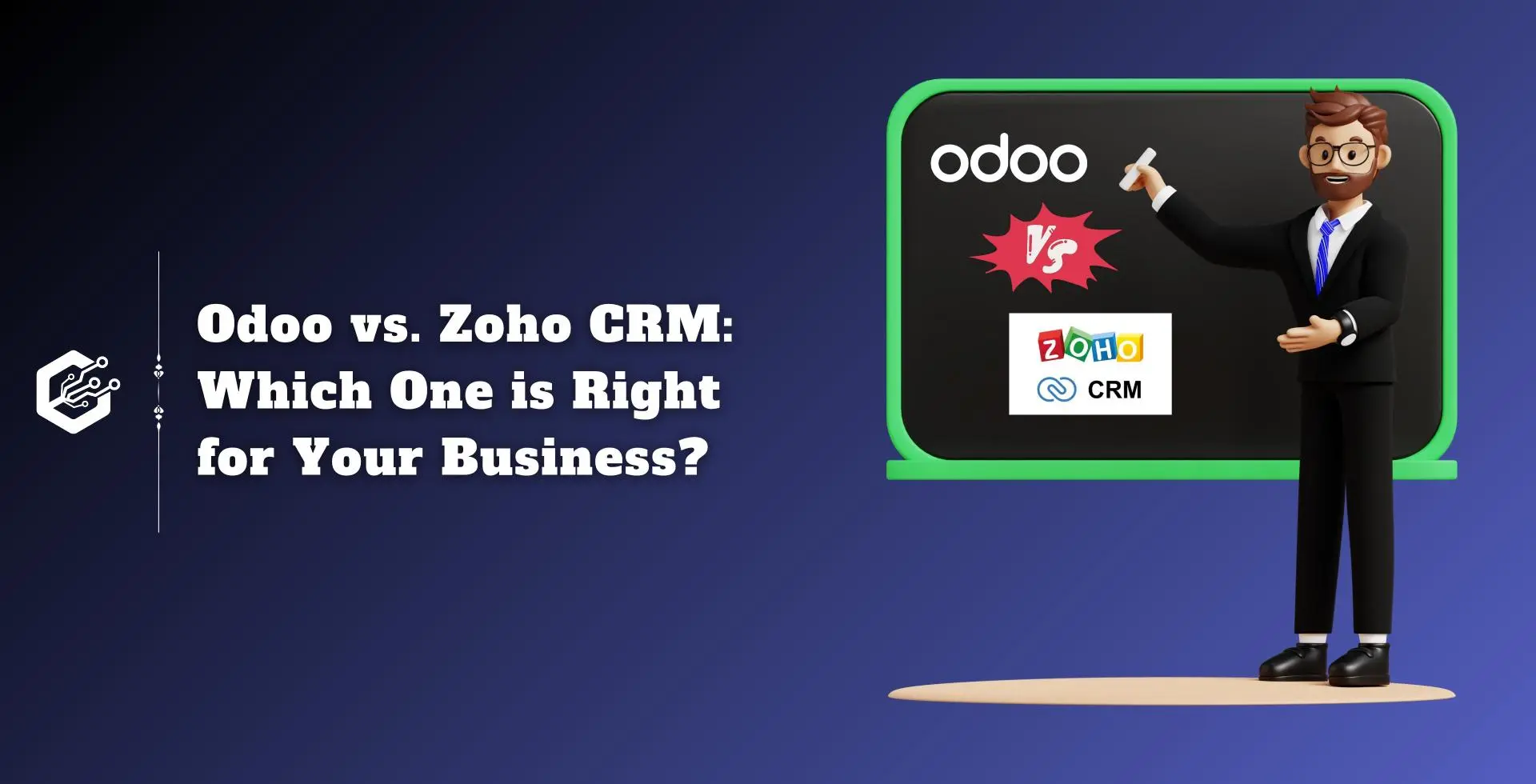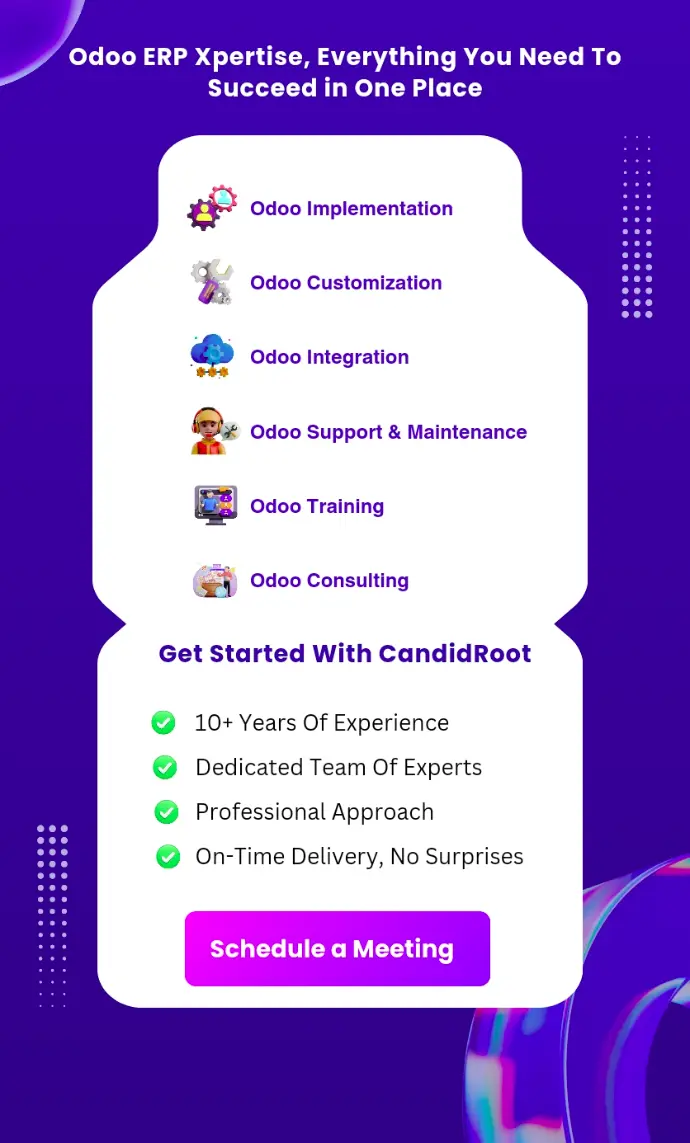Choosing the perfect CRM often feels confusing. So many options promise to help businesses grow. But not all of them fit your needs. Stuck between Odoo and Zoho CRM? You are not the only one. Each one enjoys popularity, though their operational methods differ significantly.
Odoo gives you everything in one place, while Zoho CRM is easy to use and flexible. The big question is, which one works better for your team? Choosing the right one saves time, increases sales, and makes it simpler for you. Let us simplify it and discover the best fit for your company.
What is Odoo?
Odoo is an affordable ERP solution that any company can utilize to function in its business. It has various modules, such as sales and inventory. So you can pick whatever you want. As an end-to-end solution supporting multiple aspects, you can tailor your system the way you like and tailor it to your business style.
Key Features of Odoo
Easy Setup and Clean Interface
Odoo is easy to install and navigate, with a clean and uniform design. Handling complete transactions from quotations to payments is seamless because of its well-integrated modules.
Smart Communication Tools
Integrated messaging enables users to comment directly on documents such as sales orders or invoices. This keeps communication free of clutter and enables all team members to remain updated.
Website and E-Commerce Design
You can create a website with one click and connect it to your e-Commerce, sales, and inventory applications. Even your abandoned carts are stored as draft quotations, presenting additional sales prospects.
Mobile-Friendly Design
Odoo is beautiful and runs smoothly on tablets and smartphones. A mobile preview feature allows your website to run smoothly on any device.
Cloud and Hosting Flexibility
Host Odoo on your server and in the cloud on services such as AWS or Odoo’s hosted offering. It is scalable and cloud-friendly for expanding businesses.
What is Zoho?
Zoho CRM is a cloud solution that manages customer relationships and business sales. It is one part of the larger Zoho ecosystem, which features more than 45 integrated apps to meet various business requirements. Zoho CRM has grown to be a well-known player in the SaaS industry since it entered the SaaS market in 2004 and is popularly used by small and medium-sized organizations.
Key Features of Zoho
Sales Automation
Zoho CRM streamlines sales activities with functionalities such as lead and deal management. It keeps salespeople organized, monitors progress, and closes deals quicker by automating repetitive steps.
Marketing Automation
Marketing becomes simpler with built-in email campaigns and social media engagement features. These allow companies to connect with prospective customers, post-scheduling, and monitor campaign performance all from one location.
Customer Service Automation
Help desk staff benefit from tools like ticket tracking systems and user-accessible support portals. These enable better management of customer inquiries and rapid, consistent assistance, enhancing overall customer satisfaction.
Difference Between Odoo and Zoho CRM
Category | Odoo | Zoho CRM |
Customer Support | Strong global community, extensive documentation | Phone and email support and a knowledge base are available. |
Features Comparison | Part of a full ERP suite. It includes CRM, inventory, sales, and more. | Focused CRM solution with sales marketing and customer service tools |
Pricing | Free community edition, low-cost enterprise version | Multiple price tiers, including a free plan and affordable paid plans. |
Scalability | Highly scalable. Fits small to large businesses | Scalable for small to medium-sized businesses. |
Customization | Highly customizable with open-source code and third-party apps | Custom fields are available. Less flexible than Odoo |
Integration | Good integration with many third-party apps | Integration marketplace with many app options |
Deployment | On-premise or cloud-based options, including AWS and Odoo hosting. | Fully cloud-based solution |
Odoo vs Zoho CRM
Selecting the correct CRM software can turn out to be a revolution for your company. Odoo CRM and Zoho CRM are two of the best options. These help companies deal with their customers, sales, and processes. Let us see how both differ in terms of support, pricing, features, and more.
1. Customer Support
Odoo
Odoo depends greatly on its large worldwide community and extensive documentation. Users are able to find forums, developer resources, and how-to guides. Although the community does not include official support, the enterprise edition provides specialized support. Numerous third-party partners also have Odoo support services available for companies requiring continuous support.
Zoho
Zoho CRM offers more immediate customer support. It gives assistance via phone, email, and a searchable knowledge base. Depending on your plan, you can receive access to onboard support and response-time guarantees. The platform ensures that new users can easily contact support when needed.
2. Features Comparison
Odoo
Odoo functions as a combined customer relationship management tool and a unified enterprise resource planning solution. You receive access to different business management modules, such as sales, inventory, accounting, HR, and eCommerce. The CRM system includes tools for handling prospects, tracking sales progress, and automating routine tasks. Because all apps fall under the same system, everything is closely integrated, which is perfect for companies seeking an all-in-one experience.
Zoho
Zoho is primarily concerned with customer relationship management. It has features to automate sales workflows, track leads, execute email campaigns, and handle customer support. Workflow automation is available and integrates seamlessly with other Zoho services. It is designed for companies seeking a specialized CRM experience without the extensive ERP features.
3. Odoo CRM vs Zoho CRM: Pricing
Odoo
Odoo provides a free community edition with basic features and an enterprise edition with more advanced tools. The enterprise version is reasonable in cost compared to most other ERP platforms. As it is based on a module system, you only pay for the applications you use, which can save money, particularly for small or growing companies.
Zoho
Zoho CRM offers multiple pricing levels, beginning with a free option for small teams. Paid options provide additional functionality. It includes advanced automations, analytics, and integration. Zoho has a reputation for providing a huge value. This is especially applicable to small and midsized businesses. You can pick a plan that suits your team size and feature requirements.
4. Scalability
Odoo
Odoo is very scalable and flexible for companies of different sizes. It is easy to scale up by adding the number of users or functionalities. The system comfortably supports complex workflows and numerous departments with zero to minimum inconvenience.
Zoho
Zoho CRM is optimal for small and medium-sized businesses. It can handle bigger numbers of users and transactions and offers add-ons to accommodate growing requirements. It is not necessarily as feature-laden as Odoo in terms of ERP, but it is certainly more than capable of handling business expansion in the realm of CRM.
5. Customization
Odoo
Odoo's greatest asset is that it can be customized. It is an open-source system, and Odoo developers have the freedom to modify and make any aspect of the system. Businesses are able to make custom apps, modify existing functionalities, and add third-party modules from the Odoo app store. Having this much flexibility makes it perfect for businesses with specialty workflows or industry demands.
Zoho
Zoho CRM does offer a sufficient amount of customization with custom fields, workflows, layouts, and modules. Zoho is not as open as Odoo. But it does allow users to customize their CRM experience to a certain degree. Some will be limited based on the chosen pricing plan or need additional Zoho applications.
6. Integration
Odoo
Odoo offers robust integration possibilities within its own environment as well as with third-party applications. You can integrate it with payment gateways, shipping providers, marketing software, and so forth. Because every Odoo app is developed under the same system, they have seamless integration, which saves time and prevents data silos.
Zoho
Zoho CRM plays well with Zoho's complete suite and also has a number of popular third-party integrations. Finding and setting up add-ons through the Zoho marketplace is quick and hassle-free. It is wonderful for existing Zoho application users or for finding a plugin with straightforward support.
7. Deployment
Odoo
Odoo is very flexible in deployment. Odoo's cloud service, your own server, or one of many third-party platforms are hosting options. It is, therefore, best for businesses that want to maintain full control of infrastructure and data.
Zoho
Zoho CRM is fully cloud-based. It can be accessed from any machine without having to install it or maintain a server. It suits companies in need of a speedy setup and quick access without the hassle of IT complexities.
CandidRoot Solutions is an Odoo Silver Partner and trusted Odoo ERP development company that can help you with Odoo CRM development to manage operation work in one place. We have a team of experts to develop a CRM tailored to your business requirements.
Bottom Line
Deciding between Odoo and Zoho CRM will be based on how your company functions and the degree of control and flexibility you require. Odoo is best for organizations wanting a complete ERP solution with extensive customization and complete control over deployment. Zoho CRM is best suited for organizations that require a speedy, easy-to-use CRM with excellent sales, marketing, and customer service features.
Both sites provide scalability, decent pricing, and integration capabilities, but each has its central strengths. Make the decision depending on how much you wish to do from one location vs. how straightforward and streamlined you desire your CRM to be.
Related Post:


